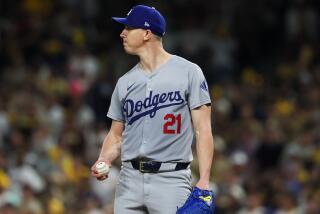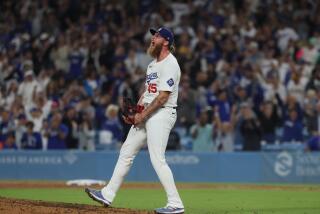Dodgers pitcher Chad Billingsley has the arm, is working on the head
- Share via
Reporting from Phoenix — Chad Billingsley can do more.
Let’s rephrase that: He should do more.
He’s a former All-Star who has won as many as 16 games in a season, but that doesn’t seem enough. Not for someone with his arm.
Billingsley says he’s aware that he’s perceived that way, which is fine with him. He, too, thinks he can do better. What he doesn’t want is for his soft-spoken demeanor to be interpreted as a sign that he’s lacking something inside.
“You think I’m not trying to do it?” the right-hander asks. “I wish I could go out there and win 35 games, get shutouts, no-hitters.”
He’s reluctant to talk about his individual goals, but insists he has several.
“I want to win 20 games,” he says. “I want to make it to the World Series. I have those goals that any pitcher has.”
Consistency has been his most significant obstacle.
He went 16-10 in 2008 but unraveled in the National League Championship Series. He was an All-Star the following season, but fell apart in the second half and wasn’t part of the Dodgers’ postseason rotation.
Last year, he gave up six or more runs in four starts, including an April debacle in Cincinnati that earned him a summons to the office of then-manager Joe Torre. Despite that, he finished the season with a 12-11 record and 3.57 earned-run average.
Entering his sixth major league season but still only 26, Billingsley says he hasn’t found ways to avoid these annual pitfalls.
“I haven’t figured it out,” he says. “This game is hard. If anyone figures it out, I want to know.
“It would be nice to put together a full good season. Six months of baseball? It’s no easy task.”
What’s made Billingsley’s bad stretches particularly troublesome is the difficultly he’s had ending them.
After five seasons in the majors, Billingsley believes he has figured out why.
He says he thinks too much.
“The outcome of a game, what happens with a hitter, it’s so complex,” he says. “I don’t know how to explain this. . . .”
And when Billingsley doesn’t get the results he wants, he tends to question himself. He says he wonders about his pitch selection. Or his game plan. Or his mechanics.
“Sometimes, I can get in my own head,” he says.
Fortunately for Billingsley, he had one of his longtime catchers by his side when he was flailing last April.
A.J. Ellis caught Billingsley as far back as 2004 in Class A. After Billingsley was hit hard in Cincinnati, Ellis offered him some advice.
Don’t try to be too perfect. Trust your stuff. Go with your best pitches. Go back to being the pitcher you used to be.
“Chad’s definitely a guy who feeds off a quick rhythm,” Ellis says. In the minor leagues, “he would get the ball and go.”
That changed Billingsley’s 2010 season.
“Sometimes, that’s where you have to go to, to go back to what got you here, to go back to the basics,” Billingsley says. “With me, everything comes off my fastball and curveball. Those are my go-to pitches.”
Here’s the tricky part: Billingsley knows he can’t be a two-pitch pitcher, at least not all the time.
“If I don’t have my good fastball, I need to go to my cutter, my changeup, or my sinker,” he says. “The days I don’t have my curveball, I’m going to throw my cutter, my changeup. You have to be smart about it.”
Pitching coach Rick Honeycutt says he’s encouraged by how Billingsley was able to break out of a midseason slump last year.
“For a young guy with high expectations, when anything goes negative, it can mushroom a little bit,” Honeycutt says. “I think he’s at a better place with himself, understanding that part of it. Any time you battle through adversity, you’re going to get stronger.”
And smarter about crisis management.
“You can’t wait for it to get better,” Billingsley says. “But you can’t force the situation, either. You have to find that happy medium.”
More to Read
Go beyond the scoreboard
Get the latest on L.A.'s teams in the daily Sports Report newsletter.
You may occasionally receive promotional content from the Los Angeles Times.










